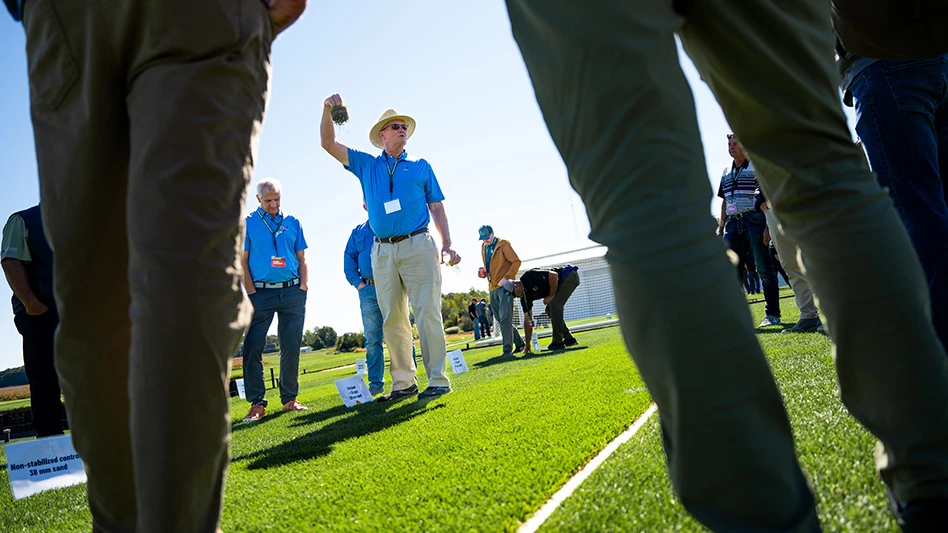
Michigan State University / Nick Schrader (3); Michigan State University / Nick Schrader and Jonan Brown (1)
In less than two years, Michigan State University will play a major role in one of the biggest sporting events in the world.
MSU is teaming up with The Fédération Internationale de Football Association, or FIFA. Its internationally recognized turfgrass management program has received a second invitation from FIFA to provide playing surfaces for the 2026 World Cup, scheduled to be played in 11 cities across the United States, plus three more in Mexico and two more in Canada.
MSU recently hosted a field day along with FIFA and partners from the University of Tennessee for stadium managers and sod farmers who will oversee installing, removing and transporting the natural turfgrass for the 2026 games. Guests were able to see the turfgrass that is currently being grown and how the natural surface is being tested using the foot lower extremities or fLEX machine that mimics the rigors of gameplay using a cleat to ensure it meets FIFA’s industry standards for field consistency.
With the grant funding investment from FIFA, the challenge for turf teams at MSU and the University of Tennessee involves developing effective and consistent fields for competitive play across three host countries.

“The fact that MSU’s turfgrass program was asked to participate and was selected for a second time shows our expertise and leadership in this field,” said John “Trey” Rogers III, a professor of turfgrass research in MSU’s College of Agriculture and Natural Resources. “FIFA’s research support for the 2026 World Cup will allow us to develop and perfect temporary turf even further and to usher in an unbelievable era.”
Three decades ago, Rogers played a role in the 1994 FIFA World Cup when his team installed a temporary grass field in the Pontiac Silverdome for the first time. The challenge was to grow turfgrass indoors that could be installed and removed from a venue. Rogers and his team showed that portable turf is possible — an innovation of its time that has now become common in the industry.
“We always felt the pressure of this project,” Rogers said. “Specifically, in carrying forward sports turf innovations.”
Today, Rogers has partnered with John Sorochan, a Distinguished Professor of Turfgrass Science and Management at the University of Tennessee. Sorochan was a graduate student of Rogers’ and worked on the World Cup project in 1994. Now, Rogers and Sorochan are co-principal investigators for the 2026 competition.

For its part, MSU developed a cool season turfgrass mixture comprised of Kentucky bluegrass and perennial ryegrass that can be grown in sand on plastic, making it easier to replicate at sod farms across North America.
For Dave Betts, a co-owner with Tuckahoe Turf Farms in Hammonton, New Jersey, who will be installing and removing the turfgrass for the New York, Boston and Philadelphia matches, the field day provided an opportunity to learn from the researchers growing the turfgrass and see and feel it for himself ahead of the World Cup matches.
“This was really impressive to see the turfgrass, learn about how it is reinforced and to see the drainage system for myself,” Betts said. “I also learned a lot about the research that went into how the turfgrass was grown and tested.”
The experience of growing turfgrass for the World Cup also provides a unique opportunity for past and current students and technicians. Ryan Bearss, Jackie Guevara, Jake Kilby and Evan Rogers are all part of MSU’s turfgrass program, and the experience of participating in this project will stay with them forever.
“The work done from 1992 to 1994 led to 30 years of innovation and adoption by the turfgrass science industry,” said Brian Horgan, professor and chair of the MSU Department of Plant, Soil and Microbial Sciences. Horgan was also an undergraduate student of Rogers’ during that time and worked on the first FIFA project. “It was an important experience in my career,” Horgan said. “I still talk about it.”

Latest from Golf Course Industry
- From the publisher’s pen: Conscientious of a bigger role
- Bernhard and Company partners with Laguna Golf Phuket
- Terre Blanche showcases environmental stewardship
- VIDEO: Introducing our December issue
- Bernhard and Company introduces Soil Scout
- Nu-Pipe donates to GCSAA Foundation’s Centennial Campaign
- GCSAA enhances golf course BMP tool
- Melrose leadership programs sending 18 to 2026 GCSAA Conference and Trade Show





